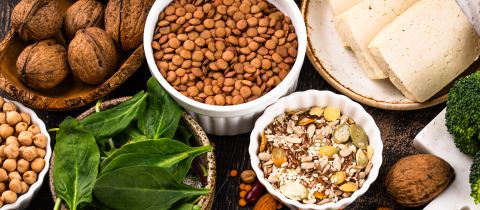No one can deny the importance of proteins in our diet. They are vital for countless body functions, especially tissue growth and repair. Proteins also provide energy to the body and help ensure a strong immune system. In striving to excel at their respective sports, many athletes subscribe to the notion that protein supplements enhance their physical performance. The existence of a multi-billion dollar supplement industry, however, does not prove that such products are necessary. Only a rigorous scientific investigation can do that.
Before delving into the science of protein supplements, let’s take a look at the differences between a supplement and a drug. Legally, dietary supplements cannot claim to cure, treat or prevent a disease, although they can convey how they potentially affect the body. Supplements do not have to go through the same regulatory process as drugs which undergo a thorough assessment for safety and efficacy before going on the market. Protein supplements therefore do not have to be proven effective before being sold. Indeed, their effectiveness continues to be a matter of ongoing debate, and with a lack of concrete evidence, many people continue to invest in this growing market.
An understanding of protein’s role in the body allows us to make an attempt at assessing the role of supplements. A normal adult requires only forty to fifty grams of protein per day in order to supply essential amino acids and replace the nitrogen eliminated in urea as waste. Essential amino acids are the nine out of twenty amino acids that the body requires but cannot produce on its own. When an amino acid is broken down, the nitrogen it contains is converted into urea by the liver which then is excreted via the kidneys.
Many athletes, body builders, or teenage boys who are looking to “bulk up” turn to protein supplements or high protein diets to enhance their performance or accelerate muscle growth. Supposedly, the amino acids arginine and ornithine promote release of growth hormone, a natural hormone that stimulates muscle development. Glutamine and carnitine have also been marketed as strength-enhancing amino acids. By taking large quantities of these proteins, athletes hope to be able to run that extra mile or lift that extra weight without failing their drug tests. But, does it work? More importantly, is it worth the risks?
A typical American diet contains approximately seventy to ninety grams of protein per day, meaning that most individuals far surpass their daily protein requirements. Dietary protein is used to replace proteins which were previously broken down and used by the body. Extra protein does not get stored. Instead, excess amino acids get converted to carbohydrate or fat. Thus, it seems that additional protein intake will not directly increase muscle growth, strength or physical performance and could even lead to weight gain and fat deposition, which are surely negative consequences for any athlete.
As a matter of fact, many health experts question the efficiency and safety of ingesting large amounts of proteins. In one study of elite junior weightlifters, consumption of protein supplements including glutamine and carnitine before workout did not result in changes in blood hormone levels during heavy training. Another study with bodybuilders found no change in blood growth hormones after consuming various mixtures of amino acids. Not only that, excess protein intake can have deleterious effects on the body. The recommended dose of protein intake for a normal adult is 0.8 g per kg of body weight per day. That’s 54 g for a person weighing 150 lb. High level athletes (and we are talking about those who compete at the national and international level, not your fifteen year-old who wants to impress a girl) require a bit more than that to compensate for their high energy output. According to one study, athletes competing in power or strength sports need about 1.6 g of protein per kg of body weight, while endurance-trained athletes need about 1.3 g per kg. There is still debate about the exact amount of proteins athletes should consume, but the consensus is that anything over 2.0 g per kg of body weight per day is excessive and no scientific evidence supports beneficial effects above this level. High protein diets on the other hand advocate protein intake on the order of 200 to 400 g a day! Too much protein intake can lead to liver and kidney overload; the liver cannot convert nitrogen into urea fast enough and the kidney has to deal with extra urea. Too much urea results in higher demand for water, which leads to dehydration. And we all know how important it is for athletes to stay hydrated. More serious problems include hyperaminoacidemia (excess amino acid in blood), hyperammonemia (excess ammonia), hyperinsulinemia (excess insulin), calcium loss and overreaction within the immune system.
All you need, really, is a balanced diet and healthy lifestyle. No need to wreak havoc in your body with excessive supplementation. A 3-oz. portion of roast white chicken meat already contains 26g of protein. Beans average about 15g per cup, and pasta contains 5g per cup. While there is evidence that extra protein can be beneficial for athletes, you really don’t need much. A double-blind study with judoists showed that a daily protein supplement of 0.5 g per kg of body weight improved the maximum oxygen uptake. The effects disappeared when judoists stopped taking the supplements. However, such amounts can be obtained from a healthy diet. The body cannot tell the difference between proteins coming from foods and proteins coming from bottles. Proponents of supplements claim that they are more readily absorbed than the protein from food and that certain amino acids increase muscle mass and decrease body fat. The fact is, there is no reason to believe that faster absorption is better; after all, muscles don’t just grow from one second to the next. The best way to gain muscle mass is to add body weight by increasing calorie intake from low fat carbohydrate sources.
Endurance or strength exercise does increase the body’s dietary protein requirement, therefore athletes who are generally more physically active than the average person, require more dietary protein. Just how much more is hard to determine but needs can certainly be met without resorting to protein supplements. Furthermore excessive protein intake is not without problems. Potential side effects include dehydration, which is secondary to high urea excretion, gout, liver and kidney damage, calcium loss, bloating and diarrhea.Yes, athletes do need more protein, but not in gargantuan amounts. And supplements are great, for those who sell them. There is nothing you cannot obtain from a healthy diet. As for bulking up... exercise by itself already significantly increases growth hormone levels, so leave the health food stores alone and head for the gym!







